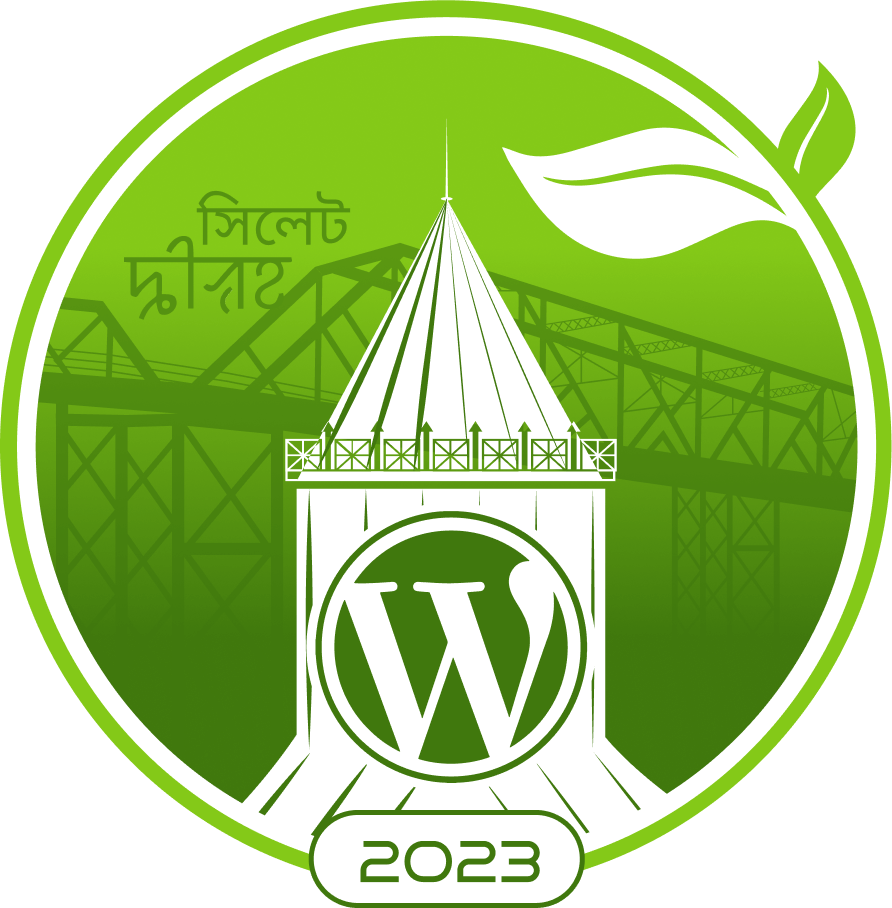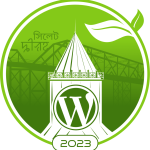Welcome to Sylhet, the crown jewel of Northeast Bangladesh. I know, like most WordPress geeks, you are looking forward to the learning, sharing, and fun of the WordCamp Sylhet event, but believe me when I say this, the city awaits you with no less wonder than the event itself. If you are anything like us, You’ll be captivated by its breathtaking natural beauty, where gentle slopes and verdant tea gardens paint a picturesque landscape.
As you explore this enchanting land, you’ll encounter hills, tea gardens, and magnificent Haors, vast wetlands that stretch as far as the eye can see. Sylhet is not only a treasure trove of natural wonders but also a haven for historic spiritual sites that echo with tales of the past.

Immerse yourself in the vibrant local culture and be inspired by a land brimming with potential for future innovation. Get ready for an unforgettable journey through the captivating charm of Sylhet with us.
Location and Weather of Sylhet
Sylhet region is located in the northeastern part of Bangladesh, lying between Jaintia and Khasia hills of Meghalaya, India, in the north and Tripura hills in the south.
The Sylhet city itself is situated on the banks of the Surma River, around 235 Kilometers Northeast of Dhaka, the capital city of Bangladesh.
The climate in Sylhet is mild and generally warm, but with a lot of rainfall. In late May (during the WordCamp event), the weather is expected to be warm, with an average daytime high of around 29.5 °C (85.1 °F) and an average low of around 21.5 ° C (70.7°F). F) (often the minimum temperature is noticeable at night). It often rains in Sylhet during this time of the year. So be ready for it.
A Glimpse into The People, Culture, and Food of Sylhet
The culture of Sylhet is so rich and captivating that it could fill countless novels. While it’s impossible to cover everything in a single blog post, we’ll give you an idea of the wealth you’ll find by visiting Sylhet during WordCamp. But first, let’s talk about the warm-hearted people that make Sylhet a truly special place.
People of Sylhet
The city of Sylhet is home to around 0.96 million people, making it the fifth-largest city in Bangladesh. The people of Sylhet are known for their warm hospitality and friendly nature. The region is inhabited by various ethnic groups, including Bangalis, Manipuris, Tripuris, and some Khasi and Garo. This multicultural mix contributes to the cultural richness and diversity of Sylhet.
Sylhet’s Vibrant Culture
Sylhet has a distinctive cultural identity shaped by its history and the fusion of various influences. The region is famous for its literature, music, dance, and traditional arts. Music like Jari and songs by Hasan Raja and Abdul Karim captivate listeners with their soulful melodies and thoughtful lyrics. Dhamail, the traditional dance of Sylhet, shows the grace and elegance of its cultural heritage.
The indigenous communities of Sylhet, with their unique customs and traditions, contribute to the rich cultural tapestry of the region. Among these fascinating cultural expressions, the Rash Mela occupies a special place. Apart from the Rash Mela, the indigenous communities of Sylhet have their own distinct languages, rituals, and art forms, which they proudly preserve and pass down from generation to generation.

Manipuri girls in traditional attires performing the Rash dance on the occasion of Rash mela. Photo Credit: The Daily Star
The Sylheti language, a variant of Bengali, occupies an important place in local culture, serving as a means of expression and preserving regional traditions.
Religion plays a vital role in the cultural fabric of Sylhet, with Islam being the predominant faith. The city is home to numerous mosques and holy sites, including the revered Hazrat Shahjalal Mazar Sharif and Shah Paran Mazar, which attract devotees and spiritual seekers from far and wide.
Sylhet’s Unique Culinary Treasures
Food is like a celebration of culture, and if you’re a foodie like we Sylhetis, it’s also nourishment for the soul. Being Full of food-loving people, this city boasts a rich culinary heritage and offers a wide range of dishes to delight your palate. Along with major Bangladeshi cuisines, Sylhet is home to unique foods influenced by the various cultural influences of the region and the availability of fresh ingredients.
One of Sylhet’s unique dishes is Akhni, a savory rice dish cooked with aromatic spices, meat, and vegetables. It is a beloved traditional preparation that showcases Sylhet’s rich culinary heritage.
For meat lovers, Sylhet offers a variety of dishes like Shatkora beef or chicken, Kala Vuna beef. You must try the beef or chicken shatkora if you don’t want to miss out on the tangy flavor of the shatkora fruit, native to the region.

To satisfy your sweet tooth, Sylhet offers a variety of traditional desserts. “Shondesh” and “Pitha” are popular choices, made with milk, rice flour, brown sugar, and coconut, and often enjoyed on festive occasions.
No culinary journey in Sylhet is complete without savoring a cup of the aromatic “Sylheti tea”. Sylhet is famous for its tea gardens, which produce some of the best tea in Bangladesh. Indulge in the refreshing flavors of Sylheti tea, known for its rich aroma and unique taste.
Sylhet’s Breathtaking Natural Beauty
Exploring the natural beauty of Sylhet feels like entering a captivating dream. With its picturesque hills, verdant tea gardens, and tranquil waterways, Sylhet is truly a haven for those who appreciate nature’s wonders. Sylhet’s natural beauty is defined by various enchanting features that make it an exceptional travel destination. Here are a few of the captivating elements that add to the irresistible charm of Sylhet’s natural scenery:
Lush Tea Gardens
Sylhet is famous for its sprawling tea gardens that cover the rolling hills, creating a picturesque and relaxing environment. The vibrant green tea bushes, meticulously maintained, offer an impressive sight and provide a glimpse into the region’s rich tea culture.

Small Undulating Hills
Sylhet is blessed with small hills adorned with lush greenery, providing panoramic views of the surrounding landscape. These hills are perfect for nature walks, hikes, and exploration, allowing visitors to immerse themselves in the untouched beauty of the region.
Haors and Wetlands
The wetlands known as the Haors of Sylhet are a sight to behold, particularly during the monsoon season. These vast bodies of water are brimming with life and provide a haven for migratory birds, making it a paradise for birdwatchers and nature lovers. The Haors’ tranquil and mesmerizing beauty offers a one-of-a-kind experience that is sure to leave a lasting impression.
Waterways and Rivers
The Surma River, gracefully flowing through Sylhet, adds a touch of elegance to the city’s natural beauty. Boat rides along the river offer a serene and peaceful experience, allowing visitors to soak in the picturesque surroundings and witness the local life along the riverbanks.
Caves and Waterfalls
Sylhet is home to several caves and waterfalls that add a sense of adventure and mystique to the natural landscape. Exploring the hidden caverns and witnessing the waterfalls surrounded by lush green forests is an unforgettable experience.
Exploring Sylhet as a WordCamp Attendee
As I mentioned earlier, Sylhet City has a lot to offer the WordCamp attendee. Let’s discuss how WordPress geeks can explore the city and enjoy its offering without any hassle.
How to Get to Sylhet
First, let’s discuss the best option to get to Sylhet from the country’s capital. As a divisional city, Sylhet is well connected to the capital through a number of ways. Sylhet is easy to get to whether you like to travel by car, train, or plane. If you choose to drive, the Dhaka-Sylhet highway will only take you 6 hours to reach Sylhet. You could also choose to take a bus from Dhaka. As of today, a ticket for a bus without air conditioning costs about 700 tk ($6-$7), while a ticket for an AC bus costs about BDT 1500 ($14).
If you prefer train travel, you have the convenience of choosing from four intercity train options departing from Dhaka to Sylhet. The ticket prices for these trains range from 265 tk ($2.5) to 1099 taka ($10). Here is the train schedule for your reference:
| Train Name | Off Day | Departure | Arrival |
| Parbat Express (709) | Tuesday | 06:20 | 13:00 |
| Joyontika Express (717) | No | 11:15 | 19:00 |
| Upoban Express (739) | Wed | 20:30 | 05:00 |
| Kalani Express (773) | Friday | 15:00 | 21:30 |
If you prefer a faster and more convenient mode of travel, flying to Sylhet is an excellent option, and you can get to Sylhet in one hour from Dhaka. Sylhet has its own domestic airport, Osmani International Airport, which offers regular flights connecting it to Hazrat Shahjalal International Airport, Dhaka. Air ticket price fluctuates a lot, but it is usually around 3000 tk ($30).
Where to Stay in Sylhet
We know for WordPress enthusiasts like you, it’s essential to ensure a smooth and comfortable stay during WordCamp. Fortunately, Sylhet has a plethora of accommodation options to suit different tastes and budgets. From esteemed establishments like the Grand Sylhet Hotel and Nirvana Inn to many other notable options, there is something for everyone. To help fellow attendees make the best choice, we’ve compiled a comprehensive list of recommended hotels, resorts, and inns. Discover our top picks by checking out our dedicated article.
Best Places to Eat in The City
When it comes to dining in Sylhet, you’ll be spoiled for choice with the city’s diverse culinary scene. From local delicacies to international cuisines, there is something to satisfy every palate.
Some of Sylhet’s restaurants are famous throughout the country for their gastronomic offer. Pach Vai restaurant is one such restaurant. If you love enjoying local cuisine, you must dine in Pach Vai, especially their Beef, Fish, and Vorta Items with rice. If you find this place too crowded, you have several alternatives like Panshi, Palki, and Alpine that also offer similar cuisine. All of these places are quite reasonable, and you can enjoy a full meal for $2.
For Indian, pan-Asian, or Western food lovers, Sylhet City offers dining options like Woondal, Chick-Chicken, Royal Chef, Spicy, Platinum Lounge, etc.
For lovers of Japanese food, Yokoso, Ichika, and Chopsticks are good options. All offer popular Japanese cousins with little local fusion. So, Don’t be surprised if you find them a bit more spicy than authentic Japanese foods.
For sweets, the town of Sylhet has countless local sweet shops, Madhumita, Dudhwala, Ghosh Dairy, and Rajmohol being famous among them.
Getting confused among all the options? We have prepared a list of recommended places to eat during your stay in Sylhet.
Where Can You Visit During Your Stay?
Sylhet is one of the major tourist destinations in the county. With its captivating natural beauty, rich history, and vibrant culture, Sylhet offers a wealth of attractions and experiences for WordCamp attendees.
From stunning landscapes to magnificent tea gardens, waterfalls, hills, and hours, you can immerse yourself in the tranquility of the paradisiacal natural beauty of this city and its surroundings. If you like historical or spiritual sites, this city also has that option. But I will not go through those tourist places as my colleagues in the community have already written in an article of the department about the tourist destinations of this city. Go read Tourist Places in Sylhet to Explore if you want to know more.
If you are wondering about the travel plan, you can read this article about city day trip plans.
Conclusion
Sylhet is a city that boasts a fascinating fusion of stunning natural beauty, rich culture, and welcoming hospitality. While attending WordCamp Sylhet, don’t miss the opportunity to discover the wonders this city has to offer. Prepare to be enchanted by the breathtaking beauty of Sylhet, immerse yourself in its lively culture, and create unforgettable experiences while attending WordCamp in this enchanting city.

